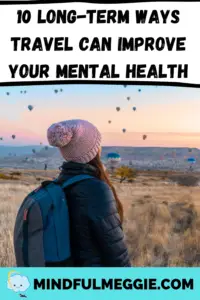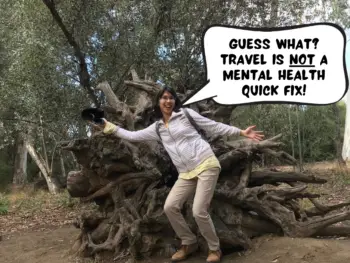
Posted: April 27, 2021
In a world full of “no,” you can say “yes” to yourself while traveling.
You are free to explore the unfamiliar: cultures, people, cities, nature destinations, and everything in between.
But consider how much work your brain is doing. The many activities you do while traveling can improve your mental health. And the benefits continue long after your trip ends!
Travelers swear by it. Even the psychological science agrees. Because travel introduces everything new into your life, when you try making sense of it all, you are exercising your brain, strengthening its cognition.
Although I have mental illnesses, such as obsessive compulsive disorder (OCD) and social anxiety, I, too, have noticed travel’s benefits on my mental health. However, I’ve been to therapy sessions before my travels, which is how I know how to cope.
While travel can benefit your mental health, it is not a form of therapy. If you have mental health problems, seek mental health services that can properly treat them.
Even if you have a mental illness, once you’ve gotten treated professionally, you, too, can hit the road, have fun, and enjoy these 10 realistic ways that travel improves your mental health in the long run:
1. Travel encourages you to get out and exercise
When you’re at home, it’s easy to excuse yourself from physical exercise: “Work has made me too tired. I have too much homework to do. I gotta check my social media feed to see what my friends are up to.”
But when you’re traveling, you must exercise! Because the point of travel is to explore, whether you are in a foreign city or a nature destination, you must get moving to capture the sights and try new experiences. While you’re innocently out and about, your physical movement releases stress-busting and mood-boosting neurochemicals called endorphins.
Better yet, your travels can encourage you to habitually exercise after your trip. I was once a teenage lazy ass who grumbled at the thought of exercising. But when my parents and I traveled to Southern California often to visit our relatives, my cousins took me on hikes through nature sites. I was inspired by my first hikes to incorporate exercise into my daily routine.
2. You learn to prioritize self-care
The more conferences I attend, the more I notice the growing topic of self-care, particularly related to mental health. Considering how hectic our lives have become, many people struggle to practice self-care.
But because travel removes yourself from the mindless 9 to 5 grind, it automatically offers you more self-care opportunities where you can do whatever and whenever you’d like. After all, self-care is all about saying “yes” to yourself!
Whether you want to chill at the beach, hike up a mountain, stroll through a silent village, ponder about your travels and mental health state in your journal, or take a long nap, you got it! Your long free time also encourages you to try living mindfully in these moments. No longer do you have your old schedule tugging at your shirtsleeve, pulling you away.
After your travels, determined not to let daily obligations invade your time and mind, you get inspired to make self-care time and mindful living ongoing.
Spending a week in Sydney, Australia, I had time aplenty to fulfill spontaneous desires. Whether I was searching for stiff-tasting Vegemite food spread in urban grocers or hopping on a ferry boat bound for the elusive, eerie Cockatoo Island, it was self-care to be present in the random activities I wanted to do.
When I eventually had to return home, I resolved to stop grinding my way through daily life. Not only did I fit in free time wherever I could, mindfulness became a lifestyle rather than a mere technique, where I lived with purpose each day.
Want to start incorporating mindfulness into your travels? Pick up my FREE GUIDE!
3. You can catch your life’s hidden flaws
Often, you don’t realize that your usual cyclical routine may contain flaws, even impeding dangers, until you remove yourself from it. It is much harder to see where things should change since everyday life is less dynamic and changing than the days you spend traveling. Even if you did notice areas of potential improvement in your normal routine, you might have still endured to continue living as is.
But because travel pulls you out of your comfort zone, it tests your tolerance as you continue living with flaws and dangers. Your days on the road can really uncover them, pushing you until you can no longer put up with them.
As a teenager, I constantly denied that I had mental health problems. I never sought help because I could tolerate the worsening symptoms — though barely — in my unchanging everyday life. But my epiphanic trip to Western Canada tested my desperate denial: I missed some of the epic natural scenery and was caught by a new friend who noticed the symptoms of my mental health issue. One painful scene after another. Finally, I snapped out of my denial. When I returned home, I set up appointments with an OCD therapist.
4. Travel lets you rethink your way of life
Your familiar surroundings can condition you into your way of life. Family, friends, and your job can make you believe that your life around them is the only one you can lead.
If you had a reset button, travel would press it!
Travel doesn’t free you only from your work, but also menial concerns and certain ideologies you may have held for a long time. When you realize that there’s more to life than the one you’ve been conditioned into, you experience freedom, knowing that you can reevaluate the way you act upon life.
Travel unsticks you from the conditioning you’ve been glued into by exposing you to new lifestyles and worlds. By interacting with people whose cultural ways of life differ from yours, you learn that there’s more than one way to live. You might consider adopting different principles and practices if you believe it will improve the quality of your life.
Inside a humble Costa Rican home for a family of three, I glimpsed around the small rooms packed with necessary items, the minimalistic lifestyle right in my face. A few weeks and thousands of miles later, my eyes darted around the stuff in my bedroom. Could I get rid of them? I thought. Not only had I fared just fine living out of two bags during my trip, but I returned to the United States an urge to live more minimally.
5. You better understand our complicated world
Travel lets you understand the world for what it really is. As you interact with people and places, you confront reality, gaining knowledge that may reduce your inflated, illogical fears.
When a missile alert rang through Hawaii, I was surprisingly calm — despite having OCD. When I asked a macho security guard where we should take cover, he ignored me as if I were a fly buzzing in his face, calling his family to express his final words of love. Watching him succumb to the woes to inevitable death was how I could understand that security officers aren’t scary robots targeting me, which helped me overcome my OCD’s trigger of airport security. Living through such experiences through travel have taught me how often my hyperactive brain can catastrophize the way I view the world.
Travel also widens your awareness of the complex world. It may even help you learn preconceived ideas that have sneaked into your mind previously, including stereotypes about certain groups of people that were portrayed by an assuming society.
Without even knowing it, you could have adopted the stereotype that all Irish people are friendly or that Asians are passive. But if you were traveling with me to Ireland, you could’ve seen both stereotypes broken under a minute. Considering how the news and our society often overlook the Asian experience and our problems, it was freeing to see that I, an Asian person myself, didn’t have to follow my race’s negative stereotypes.
It’s never mentally healthy to have false, exaggerated first impressions determine the way you perceive the world, for they may be crafting unnecessary isolation and danger. After coming back home from my trips, I’m inspired to continue understanding others and learning the truth.
6. Facing new challenges builds your resilience and independence
Traveling poses many challenges that you are forced to deal with, whether you are navigating through a new city, adapting to sudden changes in your travel plans, or gathering the courage to make friends with locals and fellow travelers.
With each problem confronted and solved, you build your flexibility, self-confidence, self-esteem, resilience, and independence. Instead of being so overwhelmed by life’s inevitable problems, you are instead prepped to tackle them all. Maybe you feel even more comfortable dealing with them than most people around you.
One of the most dire challenges on my travels was getting away from a stalker who chased me throughout my seemingly empty hotel in Florida. Thanks to the quick and witty thinking that kicked in, I not only survived that situation, but felt really proud of myself!
All this goes hand in hand with creativity…
7. You become a more creative person
When dealing with problems on the road, you must find creative solutions. After all, it’s not like you have an instruction manual or a parent by your side, pointing the way! Travel can turn you into a productive, innovative problem-solver.
Feeling defeated by my weary hike through a Costa Rican jungle, I started to sing my favorite songs, my voice ringing through trees. The creative part isn’t hitting the right musical notes but using the universal, appealing quality of song to encourage me and my classmates to carry our sorry feet out of the rainforest.
After my extensive travels, people have noticed how quickly my creative solutions can tackle the problem at hand. While other folks are avoiding the problem, crafting complex solutions, or hitting a mental roadblock that makes the matter more difficult than it really is, I whip up easy and efficient solutions.
You don’t have to be facing a problem to boost your creativity. Exposing yourself to cultural differences can psychologically make it easier for you to embrace flexibility and strength your ability to create different, original ideas. The unfamiliar stimuli in your environment can make new neural pathways in your brain.
Maybe that’s one reason why I am such a jokester and meme master!
8. Travel puts things into perspective
Your trips’ inevitable challenges, self-care opportunities, and fun days make you see that the problems you once thought were huge are actually much smaller. In the grand scheme of things, you learn to be cognizant of what matters most in life.
When I work and worry my way through a university project, the music playing in my earbuds is usually indie soundtrack from the Pacific Northwest because it reminds me to put everything into perspective. Such songs transport me back to my hikes through the rugged coastal rainforest of the Western United States and Canada.
My travels will always belong to my loving memories and daydreams, much more so than one graded assignment. I question my emotional attachments on petty concerns, while remembering the most important parts of my life.
9. You learn to acknowledge your privilege
While you’re having a jolly time on the road, you are still sharing a planet with large populations of people who are worrying about surviving to the next day. Over three billion people — nearly half the world’s population — lives on less than $2.50 a day. Nearly the same amount of people live in unsanitary conditions.
Turn around, you will always find people less privileged than you. Your opportunity to travel brings your privilege to the surface as effortlessly as bubbles, which can help you practice gratefulness. Research has shown that it boosts happiness, builds resilience, and make the most of positive and negative experiences.
Privilege not only comes from the travel opportunity itself but from meeting others on the road, whose circumstantial problems make you grateful that you don’t have them. At the very least, you realize that you are not the singled-out victim cursed with problems — as your brain likes for you to believe — but that everybody has some.
On my travels as a young adult, I’ve realized that college students everywhere have the same tiring college problems. But even more so, I’ve become grateful for my college experience perks that others don’t have. I have the freedom to choose my classes based on professor and time, even having the option to complete my education fully online, while Aline, my friend from Paris, doesn’t.
As a caution, you should never downplay your problems, especially mental health ones, by comparing them to other people’s situations — you’d only be neglecting yourself and your needs. Simply be more aware of your privilege and realize that you aren’t the only one dealing with problems.
10. Your travels prove how much you’ve grown
In moments when you feel down, reflect on your growth since your travels and respect yourself. You’ve made it so far! Your travels can inspire you to conquer future challenges, adopt a new mindset, and of course, book more airplane tickets.
And if you have a mental illness that you coped with while traveling, you’ve proved that you run your life, not your mental health problems. It’s so inspiring to see that you didn’t let your imperfect mental health stop you from embarking on a grand trip. Always value your successful experiences while traveling because they can motivate you to push through your darkest moments.
During my travels, specific conditions can trigger my OCD, bringing about unwanted, terrible thoughts. After I overcome them, I feel like a fucking amazing rock star, during and long after my trip. I’ve taken charge of my life before, and I can do it again.
***
All trips eventually end, but not their mental health benefits, which leave a lasting legacy on you.
Traveling requires you to exercise your brain. After all, you’re busy accepting new cultures, solving problems, understanding more about yourself, and reevaluating your life. But don’t forget that your travels also give you and your mind a well-deserved break from everyday life.
As an important reminder, never rely on travel to cure your mental health problems. You should seek professional mental health services, in that case. Once you’ve been successfully treated, then you can focus on taking your trip.
That’s the great thing about travel. While you’re having fun and getting excited about new people and places, your mental health is improving. It’s so natural that you may not even realize it at first!
Share on Pinterest!









 Little Saigon, Big Foreigner: The Struggle to Connect with My Vietnamese Heritage is Real
Little Saigon, Big Foreigner: The Struggle to Connect with My Vietnamese Heritage is Real